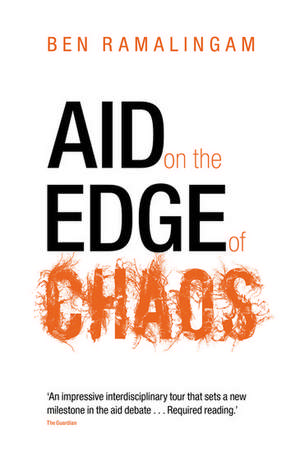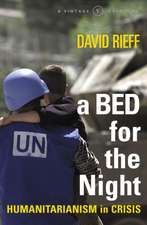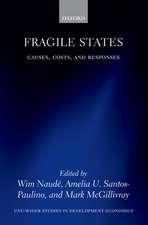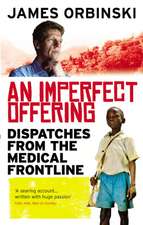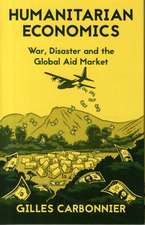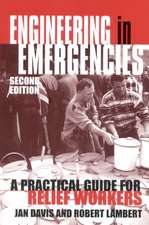Aid on the Edge of Chaos: Rethinking International Cooperation in a Complex World
Autor Ben Ramalingamen Limba Engleză Paperback – 16 apr 2015
| Toate formatele și edițiile | Preț | Express |
|---|---|---|
| Paperback (1) | 157.00 lei 31-37 zile | +46.67 lei 4-10 zile |
| OUP OXFORD – 16 apr 2015 | 157.00 lei 31-37 zile | +46.67 lei 4-10 zile |
| Hardback (1) | 238.95 lei 10-16 zile | |
| Oxford University Press – 24 oct 2013 | 238.95 lei 10-16 zile |
Preț: 157.00 lei
Preț vechi: 176.84 lei
-11% Nou
Puncte Express: 236
Preț estimativ în valută:
30.05€ • 32.65$ • 25.26£
30.05€ • 32.65$ • 25.26£
Carte tipărită la comandă
Livrare economică 10-16 aprilie
Livrare express 14-20 martie pentru 56.66 lei
Preluare comenzi: 021 569.72.76
Specificații
ISBN-13: 9780198728245
ISBN-10: 0198728247
Pagini: 480
Ilustrații: Cartoons and Figures
Dimensiuni: 155 x 233 x 26 mm
Greutate: 0.7 kg
Editura: OUP OXFORD
Colecția OUP Oxford
Locul publicării:Oxford, United Kingdom
ISBN-10: 0198728247
Pagini: 480
Ilustrații: Cartoons and Figures
Dimensiuni: 155 x 233 x 26 mm
Greutate: 0.7 kg
Editura: OUP OXFORD
Colecția OUP Oxford
Locul publicării:Oxford, United Kingdom
Recenzii
The examples presented in this work should prompt a reconsideration of how one thinks of foreign aid.
An exhaustive tour of the complex systems research landscape, including how it is used to understand phenomena as diverse as climate change, food price rises, ethnic segregation and the Arab spring ... Important and relevant for the aid world.
The most interesting part of Mr Ramalingam's book is his discussion of how some agencies are beginning to learn from the way poor people can successfully do difficult things... [and that] experimenting repeatedly and quickly has much to offer the world of aid.
Sets a new milestone in the aid debate... an impressive interdisciplinary tour
This book explains an important global activity few outsiders understand, and important scientific ideas that might yet turn it around.
Masterful. An important step towards changing our institutions and organizations Ramalingam skilfully draws upon a diverse body of ideas and research to deliver a vital message for aid and beyond.
Aid on the Edge of Chaos will change the way you think... One of the most important books you will read about development.
The accolades on the cover are well-founded; this is a great read, engagingly written, and full of vivid examples, poignantly-funny cartoons and a reflective humility that suits its subject matter.
Many see international development aid as in thrall to linear, mechanized thinking, and champion approaches in which local people solve their own challenges with intelligently tailored backing. Ben Ramalingam offers a scientific model for that path... and fosters a new aid paradigm: an open innovation network, catalysing and leveraging change in countries around the world.
Breathtaking . . . catapults development thinking into the 21st century . . . read this book and be changed.
Ben Ramalingam's thought provoking and highly readable book re-frames the debate on aid and development challenges the existing aid paradigm and points the way towards a genuinely new approach - a new approach that is urgently needed.
Ben Ramalingam's tour de force of a book provides an unorthodox and fascinating insight into today's global aid sector: its current practices and sometimes faulty theories of action. This book is a vital source of inspiration.
Marrying science, policy and practice with a deep moral conscience, this important book points to a future that that we should all be working towards.
Challenging... Much needed. Ramalingam pushes his reader to question traditional wisdoms, navigate different disciplines, and value the import of local experience.
Ramalingam sets out a challenge to everyone working in international cooperation, to rethink our basic assumptions and to think and act in ways that are more attuned to the real world in all its complexities. This is one to read and re-read.
Ben Ramalingam convincingly shows why transformational change is so badly needed in foreign aid, and where it might come from.
This well-written and thought-provoking book is an important contribution to redesigning aid for a messy, complex world.
Ben Ramalingam is a leading champion of the adaptive, scientific, trial-and-error thinking that the aid industry badly needs.
This excellent book [is] a must-read for anyone interested in development, its current discontents, and its future potential.
This is a superb book, boldly facing in this age of globalization the complexity of aid to developing countries. Impressive and inspiring, this work is destined to become a 21st century classic.
With beautifully clear writing and stories, Ben Ramalingam uses complexity concepts to reveal the deep reasons for why aid sometimes works and sometimes doesn't.
Far from being a pessimistic funeral march, Ramalingam's wide-ranging discourse provides many inspiring examples of how complexity theory can be put to practical and meaningful use, and lays out a hopeful path forward.
Well-intentioned aid agencies sometimes oversimplify the problems they need to solve. [this] book makes the good case that the growing field of complex adaptive systems can help prevent such errors from being repeated.
This brilliant book will energise the struggle to make big government, big money and big aid sensitive to contexts, humble about what they can achieve, and sophisticated about the connectedness of things.
Ben Ramalingam seamlessly combines practical experience, policy relevance and scientific expertise. Aid on the Edge of Chaos deserves a very wide audience.
A terrific, stimulating book. Ramalingam clearly and engagingly shows how the use of complex adaptive systems thinking can significantly strengthen and enhance the impacts and effectiveness of global foreign aid.
A magnificent piece of work a major contribution to the debate about how to rethink and improve the way we deliver aid worldwide.
An exhaustive tour of the complex systems research landscape, including how it is used to understand phenomena as diverse as climate change, food price rises, ethnic segregation and the Arab spring ... Important and relevant for the aid world.
The most interesting part of Mr Ramalingam's book is his discussion of how some agencies are beginning to learn from the way poor people can successfully do difficult things... [and that] experimenting repeatedly and quickly has much to offer the world of aid.
Sets a new milestone in the aid debate... an impressive interdisciplinary tour
This book explains an important global activity few outsiders understand, and important scientific ideas that might yet turn it around.
Masterful. An important step towards changing our institutions and organizations Ramalingam skilfully draws upon a diverse body of ideas and research to deliver a vital message for aid and beyond.
Aid on the Edge of Chaos will change the way you think... One of the most important books you will read about development.
The accolades on the cover are well-founded; this is a great read, engagingly written, and full of vivid examples, poignantly-funny cartoons and a reflective humility that suits its subject matter.
Many see international development aid as in thrall to linear, mechanized thinking, and champion approaches in which local people solve their own challenges with intelligently tailored backing. Ben Ramalingam offers a scientific model for that path... and fosters a new aid paradigm: an open innovation network, catalysing and leveraging change in countries around the world.
Breathtaking . . . catapults development thinking into the 21st century . . . read this book and be changed.
Ben Ramalingam's thought provoking and highly readable book re-frames the debate on aid and development challenges the existing aid paradigm and points the way towards a genuinely new approach - a new approach that is urgently needed.
Ben Ramalingam's tour de force of a book provides an unorthodox and fascinating insight into today's global aid sector: its current practices and sometimes faulty theories of action. This book is a vital source of inspiration.
Marrying science, policy and practice with a deep moral conscience, this important book points to a future that that we should all be working towards.
Challenging... Much needed. Ramalingam pushes his reader to question traditional wisdoms, navigate different disciplines, and value the import of local experience.
Ramalingam sets out a challenge to everyone working in international cooperation, to rethink our basic assumptions and to think and act in ways that are more attuned to the real world in all its complexities. This is one to read and re-read.
Ben Ramalingam convincingly shows why transformational change is so badly needed in foreign aid, and where it might come from.
This well-written and thought-provoking book is an important contribution to redesigning aid for a messy, complex world.
Ben Ramalingam is a leading champion of the adaptive, scientific, trial-and-error thinking that the aid industry badly needs.
This excellent book [is] a must-read for anyone interested in development, its current discontents, and its future potential.
This is a superb book, boldly facing in this age of globalization the complexity of aid to developing countries. Impressive and inspiring, this work is destined to become a 21st century classic.
With beautifully clear writing and stories, Ben Ramalingam uses complexity concepts to reveal the deep reasons for why aid sometimes works and sometimes doesn't.
Far from being a pessimistic funeral march, Ramalingam's wide-ranging discourse provides many inspiring examples of how complexity theory can be put to practical and meaningful use, and lays out a hopeful path forward.
Well-intentioned aid agencies sometimes oversimplify the problems they need to solve. [this] book makes the good case that the growing field of complex adaptive systems can help prevent such errors from being repeated.
This brilliant book will energise the struggle to make big government, big money and big aid sensitive to contexts, humble about what they can achieve, and sophisticated about the connectedness of things.
Ben Ramalingam seamlessly combines practical experience, policy relevance and scientific expertise. Aid on the Edge of Chaos deserves a very wide audience.
A terrific, stimulating book. Ramalingam clearly and engagingly shows how the use of complex adaptive systems thinking can significantly strengthen and enhance the impacts and effectiveness of global foreign aid.
A magnificent piece of work a major contribution to the debate about how to rethink and improve the way we deliver aid worldwide.
Notă biografică
Ben Ramalingam is an independent researcher, consultant and writer specialising on international development and humanitarian issues. He has worked with and advised leading development and humanitarian organisations including UN bodies, NGOs, the Red Cross movement, and government agencies. He holds honorary positions at the London School of Economics, the Overseas Development Institute, and the Institute of Development Studies at Sussex University.
